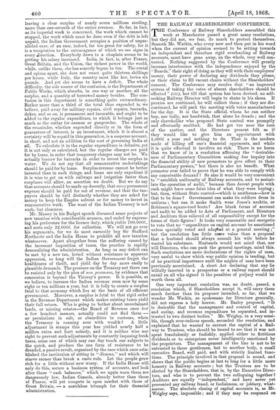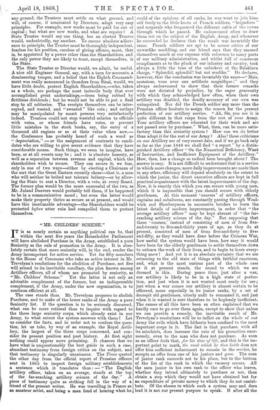THE RAILWAY SHAREHOLDERS' CONFERENCE. T HE Conference of Railway Shareholders assembled
this week at Manchester passed a great many resolutions, but they did not, we fear, do much to protect themselves. Smooth Mr. Watkin, who every now and then put in his word when the current of opinion seemed to be setting towards an independent and therefore rigid overhauling of Railway accounts, must have gone away, on the whole, very well con- tented. Nothing suggested by the Conference will greatly increase interference with the independence enjoyed by the "Boards," their right of doing as they will with their employers' money, their power of declaring any dividends they please, or their claim to fill vacant chairs without the Shareholders' consent. The Conference may resolve that " an improved system of taking the votes of absent shareholders should be effected " (sic), but till that system has been devised, no self- seeking Railway Director will begin to shake in his shoes. If proxies are continued, he will collect them ; if they are dis- continued, he will pack the meeting with votes manufactured for the day. It is the State official, whom he can neither buy, nor bully, nor hoodwink, that alone he dreads ; and the only shareholder who proposed State control was promptly and effectually snubbed. He had got too near the root of the matter, and the Directors present felt as if they would like to give him an appointment with 1,0001. a year and nothing to do. That is the modern mode of killing off one's financial opponents, and while it is quite effectual it involves no risk. There is no harm that we know of in a resolution affirming the " desirable- ness of Parliamentary Committees making due inquiry into the financial ability of new promoters to give effect to their Parliamentary powers," but there is also no benefit. What promoter ever failed to prove that he was able to comply with any conceivable demand ? So also it would be very convenient to " establish uniformity of Railway accounts, and to assimi- late the operation of audit," because then decent people with cash might have some faint idea of what they were buying ; but, then, without State control—which is anathema—how is that to be done ? Government can make its soldiers dress in uniform ; but can it make Smith wear Jones's necktie, or Robinson's square-toed boots ? Are blank forms of account and audit to be added to Acts of Parliament, and Directors and Auditors thus relieved of all responsibility except for the forms of their figures ? It looks very reasonable and energetic to vote that no "expenditure on capital account be sanctioned unless specially voted and adopted at a general meeting ;" but the resolution has little mere value than a proposal that a husband should always consult his wife before he wasted his substance. Husbands would not mind that, nor will Directors, who can pack the general meetings, mind this. Such resolutions are mere declarations of the rights of man, very useful to show which way public opinion is tending, but of no practical importance until the mights of man have been previously ascertained. A short Act declaring that any lie wilfully inserted in a prospectus or a railway report should entail on all who signed it the penalties of perjury would be worth them all.
One very important resolution was, no doubt, passed, a resolution which, if Shareholders accept it, will carry them much further than its proposer intended, so far, that we wonder Mr. Watkin, as spokesman for Directors generally, did not express a holy horror. Mr. Bazley proposed, "It is desirable that the management and control of capital, and outlay, and revenue expenditure be separated, and in- trusted to two distinct bodies." Mr. Wrigley, in a very sensi- ble, though over-tedious speech, seconded the resolution, and explained that he wanted to entrust the capital of a Rail- way to Trustees, who should be bound to see that it was not spent fraudulently or foolishly, applied either to fictitious dividends or to enterprises never intelligently sanctioned by the proprietors. The management of the line is not to be entrusted to these gentlemen, but to another body, a small executive Board, well paid, and with strictly limited func- tions. The principle involved in that proposal is sound, and shows that the public begins at last to long for a little more honesty in Railway accounts ; but the Trustees are to be elected by the Shareholders, that is, by the Executive Direc- tors, and who is to prevent the two colloguing together ? Auditors are equally "independent," and have never yet prevented any railway fraud, or foolishness, or jobbery, what- soever. The absolute closing of capital accounts is, as Mr. Wrigley says, impossible ; and if they may be reopened on
any ground, the Trustees must settle on what ground, and will, of course, if nominated by Directors, adopt very easy principles. For example, new works must be paid for out of capital ; but what are new works, and what are repairs ? A State Trustee would say one thing, but an elected Trustee would, undoubtedly, say another. To ensure absolute adher- ence to principle, the Trustee must be thoroughly independent, fearless for his position, careless of giving offence, must, that is, be appointed by a power other than the Shareholders, and the only power they are likely to trust, except themselves, is the State.
The State Trustee or Director would, we admit, be useful. A nice old Engineer General, say, with a turn for accounts, a domineering temper, and a belief that the Eighth Command- ment was really announced in thunders from Sinai, would, we have little doubt, protect English Shareholders,—who, taken as a whole, are perhaps the most imbecile body that ever accomplished great undertakings,—from being robbed by fictitious dividends ; but he would not be able to put a final stop to all robberies. The receipts themselves can be inter- cepted, and wasted, and " sweated " like coin ; and outlays may be manipulated by smart persons very satisfactorily indeed. Trustees could not stop wasteful salaries to officials with votes, or whose friends have votes, or prevent little mistakes in the stock books, say, the entry of a thousand old engines or so at their value when new,— the Conference has probably heard of such a word as " depreciation," — or the assignment of contracts to candi- dates who are willing to give secret evidence that they have considerable means. Such things, we seem to imagine, have been, or at all events may be ; and it is absolute honesty, as well as a separation between revenue and capital, which the shareholders wish to secure. They can secure it, we fear, only in one of two ways—either by electing a Chairman of the sort that the Great Eastern recently chose—that is, a man who will neither be bribed nor tolerate bribery—or by allow- ing the State to seat a Director, with a veto, at every Board. The former plan would be the more successful of the two, as Mr. 1-nland Danvers would probably tell them, if he happened to be in a communicative mood ; but even the latter would make their property thrice as secure as at present, and would have this inestimable advantage—the Shareholders would be protected before utter ruin had compelled them to protect themselves.































 Previous page
Previous page